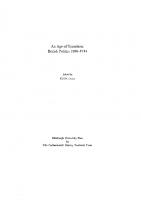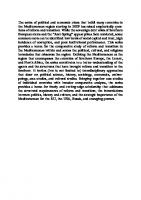An Age of Transition: British Politics 1880-1914: Parliamentary History Vol.16.1 9780585070254
This is an issue of our journal Parliamentary History.
130 8 17MB
English Pages 140 [142] Year 2022
Recommend Papers

- Author / Uploaded
- E H H Green
File loading please wait...
Citation preview
An Age of Transition
An Age of Transition: British Politics 1880-1914
Edited by E.H.H. Green
Edinburgh University Press for The Parliamentary History Yearbook Trust
© 1997 Edinburgh University Press Edinburgh University Press 22 George Square Edinburgh
Transferred to digital ptint 2004 Typeset in Bembo by W estKey Limited, Falmouth, Cornwall Printed and bound by CPI Antony Rowe, Eastboume
A CIP record for this title is available from the British Library ISBN 0 7486 0926 1
CONTENTS Preface list of Contributors
VI
vii
E.H.H. GREEN, An Age of Transition: An Introductory Essay JON LAWRENCE and JANE ELLIOT'!; Parliamentary Election Results Reconsidered: An Analysis ofBorough Elections, 1885-1910
18
FRANS COETZEJ; Villa Toryism Reconsidered: Conservatism and Suburban Sensibilities in Late-Victorian Croydon
29
DUNCANTANNER, The Development of British Socialism, 1900-1918
48
SANDRA DEN OTTER, 'Thinking in Communities': Late Nineteenth-Century Liberals, Idealists and the Retrieval of Community
67
MARGARETO'CALLAGHAN Franchise Reform, 'First Past the Post' and the Strange Case of Unionist Ireland
85
CLAIRE EUSTANCI; Protests from Behind the Grille: Gender and the Transformation of Parliament, 1867-1918
107
Index
127
PREFACE This present collection of essays on An Age cif Transition: British Politics 1880-1914 is the fourth in a series of special volumes sponsored by the journal Parliamentary History, and published by Edinburgh University Press for The Parliamentary History Yearbook Trust. The series will consist of volumes on particular topics as well as collections of essays covering specific periods (like the present one). The fifth in the series to be published in early 1998 will be on 'Parliament and Locality' from the seventeenth to the twentieth centuries. Further volumes are planned on the Church and Parliament and on Ireland and Parliament. In the footnotes, the place of publication is London unless otherwise stated. As editor of Parliamentary History I would like to thank the editor and contributors to this volume, and to Alasdair Hawkyard who compiled the index. Clyve Jones General Editor
LIST OF CONTRIBUTORS Frans Coetzee teaches in the History Department at George Washington University. He is the author of For Party or Country: Nationalism and the Dilemmas of Popular Conse"'atism in Edwardian England (Oxford, 1990), and co-editor of World War I and European Society (Boston, Mass., 1995) and Authority, Identity and the Social History of the Great War (Providence, R.I., 1995).
Sandra den Otter, Assistant Professor of History at Queen's University, Kingston, Ontario, is the author of British Idealism and Social Explanation: A Study in Late Victorian Thought (Oxford, 1996). Her current work addresses the ways in which mid-century social theorists interpreted law, community and the individual via their engagement with British India E.H.H. Green studied at University College, London, and St John's College, Cambridge, and is currently Fellow and Tutor in Modem History at Magdalen College, Oxford. He is the author of The Crisis cif Conse"'atism: The Politics, Economics and Ideology ofthe British Conservative Party, 1880-1914 (1995), and has also published a number of articles on late nineteenth- and early twentieth-century British politics and political economy.
Jane Elliott is a Research Fellow at the University of Manchester. Her research interests include the analysis oflarge and complex datasets, and combining qualitative and quantative methodologies in the social sciences. She is currently working on an E.S.R.C.-funded project entitled 'Putting Qualifications to Work'.
Claire Eustance is a Research Fellow in the School of Humanities at the University of Greenwich. She is co-editor of The Men's Share? Masculinities, Male Support and Women's Suffrage in Britain, 1890-1920 (forthcoming), and is currently working on a book on the Women's Freedom League, based on her University ofYork D. Phil. thesis.
Jon Lawrence is Lecturer in Modem History at the University of Liverpool. His publications on late Victorian and Edwardian popular politics include articles in the journal cif British Studies and English Historical Review. His Speaking for the People? Party, Language and Popular Politics in England, 18 67-1918 will appear from Cambridge University Press in 1997.
Margaret O'Callaghan studied at University College, Dublin, and St John's College, Cambridge, and is currently Lecturer in Politics at Queen's University, Belfast. She is the author of Britis~ High Politics and a Nationalist Ireland: Criminality, Land and the Law Under Forster and Balfour (Cork, 1994), and has published a number of articles on Irish politics and questions oflrish cultural identity in the late nineteenth and twentieth centuries.
Duncan Tanner is Professor of History at the University of Wales, Bangor, and Head of the School of History and Welsh History. Publications include Political Change and the LAbour Party, 1900-18 (Cambridge, 1990).
An Age of Transition: An Introductory Essay E.H.H. GREEN Magdalen College, Oxford
Historians are constantly discovering crises, watersheds, climacterics and turning points. Less charitable commentators might say that they are always inventing them, and that an historian of the Fall would probably seek to present the departure from Eden as 'an age of transition'. So what is it about Britain in the late nineteenth and early twentieth century, and British political developments in particular, that justifies the title of this collection? In 1880 Britain's position in the world, its social and economic structures and its political institutions and practices would have been quite familiar to a time traveller from the 1840s. In international terms Britain had retained and strengthened its imperial presence, but when in 1883]. R. Seeley noted that Britain had 'conquered and peopled half the world in a fit of absence of mind' 1 he was drawing attention to the unspectacular nature of British imperial expansion. The Empire had grown over 40 years, but largely through a gradual accretion of territories and informal influence of the kind that had characterized the earlier part of the century. 2 Britain in 1880, as had been the case in the 1840s, possessed a vast and expanding Empire, but, as Seeley implied, it was difficult to detect British imperialism as a self-conscious ideology or guiding policy, and, equally important, the Empire had rarely been at the centre of political debate. Likewise Britain's diplomatic outlook was very similar to that of the earlier part of the century. From the vantage point of1880, the Crimean entanglement could only seem an aberration in terms ofBritain's international relations since the end of the Napoleonic Wars. With the Royal Navy's unquestioned supremacy providing a basic guarantee against potential aggressors, as well as ensuring the security of international and imperial trade, Britain's avoidance of continental alliances seemed both understandable and entrenched. If Britain's international position in 1880 appeared to be as, if not more, secure than it had been in the 1840s, and based on similar premisses and policies, Britain's domestic social and economic scene would also have been familiar to our time traveller. In the 1840s Britain was the most industrialized and urbanized nation in the world, and its manufacturers, merchants, shippers and bankers were the dominant force in international trade and commerce. In the early 1880s this was still the case. Britain had a 41 per cent share of international trade in manufactures, produced 26.6 per cent of the world's manufactured goods and 34.7 per cent of world iron and steel R. Seeley, The Expansion of England (1884, 1887 edn), p. 10. For the best recent survey see P. Cain and A. Hopkins, British Imperialism (2 vols., Harlow, 1993), I, Innovation and Expansion, 168()-1914. 1
2·
].
2
E. H. H. Green
output. In 1880 Britain had not only retained but extended its role as the world's banker and shipper. Britain's overseas investment assets totalled over £1 billion by the late 1870s, more than three times that of its nearest rival France. The British merchant marine made up 38 per cent of the world's tonnage, and 25 per cent of the world's trade went through Britain's ports. 3 This continuing process of industrial and urban development had altered Britain's economic and social structures in the third quarter of the century, but there were still important aspects of continuity. In 1841 Sir Robert Peel had argued that the die was cast in relation to Britain's economic development, in that the predominance of agriculture had passed and the balance had tipped towards industry and the towns. Yet, in 1881 agriculture continued to contribute 15 per cent of Britain's G.D.P. and provided a livelihood for 1.5 million people. Agricultural workers were, at almost 900,000, the largest labouring group in a single trade, and the arable sector continued to account for 40 per cent of agricultural production. 4 In spite of fears that the repeal of the Com Laws would destroy British agriculture, especially the arable areas, the period from the late 1840s to the early 1870s had proved to be a golden age for British farming. Britain in 1881 was a more industrial and urban nation than it had been 40 years earlier, but the pace of change had been and remained gradual. In the political sphere there were also marked continuities with the earlier period. The general election of 1880 saw the old Peelite Gladstone replace the old spokesman of Tory protectionism Disraeli as Prime Minister. The chief offices of state and the front benches of both major parties were filled by Britain's aristocratic elite, and the House of Commons was still dominated by landed M.P.s. Moreover, high political life continued to keep time with the rhythms of aristocratic and landed life - with the parliamentary timetable in step with the London se:1son, the races and the grouse moors. The electorate had been extended to a large section of the urban working class in 1867, but British politics in town and country was still very much a 'politics oflocal notables' -at both the centre and periphery of politics the parties were largely reliant upon informal (i.e. non bureaucratic) social and associational forms of organization. 5 Likewise the 'stuff of politics' - the issues which dominated political debate - displayed marked continuities with the earlier period. Reform of the administrative machinery of the state, the nature oflocal government in urban centres, the governance of Ireland, and confessional questions concerning the role of the Anglican Church and the provision of education, had provided the main points of controversy in Parliament and the localities from the mid 1840s to the late 1870s. The issue of the franchise had been prominent in the mid 1860s, but it could hardly be said that there was an continuing clamour for further refonn in the 1870s. Following the collapse of Chartist agitation in the late 1840s and early 1850s there were few signs of social and political unrest amongst the lower echelons of British society. The fear of a class 3 · See F. Crouzet, The Victorian Ecotwmy (1982), pp. 342-80; R. Floud, 'Britain 1860-1914: A Survey' in An Economic History if Britain Since 1700, eds. R. Floud and D. McCloskey (2nd edn, 3 vols., Cambridge 1994), I. 1-28. 4 · See C. O'Grada, 'British Agriculture, 1860-1914' in Floud and McCoskey (eds.), Ecot1omic History









